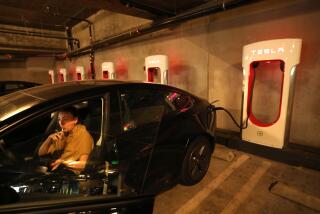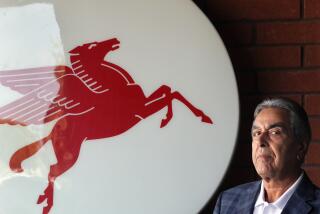Quicklube Is Here : Oil Changes Join Burgers in Fast Lane
- Share via
The motor oil and lubrication business for years has been slow as molasses, a sleepy world where excitement might masquerade as the introduction of a plastic grease tube. It’s been a sluggish market in which technology has changed as slowly as oil drains from a crankcase.
Changing a car’s oil and greasing its joints, meanwhile, remain dreary tasks by any measure. Do-it-yourselfers must crawl under the car, get their hands dirty and then figure out what to do with the dirty oil. Everyone else has had to leave the car at a shop all day and bum a ride to work.
With such a bleak set of facts, something had to give.
It has, and the result is the newest fast-food clone. Welcome to the world of the 10-minute lube job and oil change, where quicklube is the word, the price is about $20 and no appointment is necessary.
Jeff Williams, 29, was at a Jiffy Lube shop in Whittier the other day.
An Inexpensive Convenience
“I used to do this myself, but it’s almost as cheap here,” said Williams, a building superintendent from La Mirada who brought his 2-year-old daughter along on the brief errand. “I always had a tough time getting the oil filter off, and I got tired of cleaning up the mess. It would take me 35 or 40 minutes.”
Nobody knows how far this industry will go, but several factors seem to have greased its way:
--The aging of the U.S. population. The do-it-yourself crowd, which does more than half of all oil changes, is getting too old to enjoy crawling under cars.
--The demise of the full-service gas station, where lube jobs and oil changes always had been done.
--The inconvenience and less-than-perfect reputations of repair shops and dealerships. Says one quicklube operator whose shop is almost as squeaky clean as a Burger King: “I’m in a field where it’s easy to look good.”
--The two-breadwinner household. Nobody has time to do anything anymore.
Big Corporate Money
The industry expects quicklube shops to be opening at a rate of three every day in 1987, double the current national inventory of perhaps 1,200 shops. The surge is made possible by a sudden infusion of big corporate money into what, until recently, has been an assortment of under-financed mom-and-pop operations.
In the past year, three major players in the $10-billion-a-year oil-change business have gambled on a quicklube future: Quaker State acquired the 130-store Minit-Lube chain. Valvoline swallowed up 60 Rapid Oil Change stores in Minnesota, Wisconsin and New York, and Pennzoil entered a $100-million real estate partnership with Jiffy Lube International, the biggest of the quicklube chains with 420 stores.
The three ventures are planning more acquisitions and starting new stores from the ground up. They are quickly taking over a market that was created in helter-skelter fashion by local entrepreneurs, beginning in the mid-1970s.
McLube, a blending of the McDonald’s quick-service, short-menu idea and the specialization of automotive service that has already captured parts of the muffler, rustproofing, tire and other business from gas stations and dealers, has its roots in Salt Lake City.
The peculiar marketing synergy that seems to exist between cars and hamburgers prompted a regional hamburger chain in the Salt Lake area to start Minit-Lube outlets in 1976. It borrowed the basic format from a handful of Jiffy Lubes already doing business in the region. The two chains have been growing ever since.
Chains Proliferating
Meanwhile, an estimated 200 others went into business. These range from one-store operations to small chains such as Auto Oil Changers, based in Long Beach, the Lube Pit Stop chain in the San Fernando Valley and the Oil Store chain--recently converted to a Jiffy Lube franchise--in southeast Los Angeles.
Proprietors such as Tom Burney, who started the 11-shop Oil Store chain, are conscious of the fast-growing industry’s image and hope to repeat the McDonald’s miracle. While the hamburger empires have become homogenized as they’ve grown, however, the much younger quicklube business is still attracting an eclectic group.
At Darrell’s Grease and Go in Des Moines, Iowa, the 10-minute services offered range from an “economy” oil change for $15.88 to the “boob-and-lube” for $29.88. In the latter, a topless woman washes the windows and vacuums the interior. Proprietor Darrell Lafon reports that business is good.
Another quicklube pioneer was Dan Walker, the former governor of Illinois. Jiffy Lube bought out his troubled operation in Chicago last year.
With few variations from one operation to the next, quicklube is a drive-through arrangement that offers to change the oil and oil filter, lubricate the chassis and check and top off the transmission, differential, brake, power-steering and window-washer fluids, all in 10 minutes. Some shops also wash the windows and vacuum the interior.
Known by Two Names
“We have trouble deciding what to call the industry,” said Burney. “Some want to call it the fluid maintenance industry and others want to call it quicklube.”
Jiffy Lube Chairman James Hindman, who was head coach at Western Maryland College when he bought the fledgling Jiffy Lube chain in 1979 and set it on a growth course, said:
“We’re selling convenience. I had one of the kids take my car down to a shop for some routine maintenance, and they made it so inconvenient and did such a poor job that I figured if you made it convenient and added cleanliness and quality products, you’d have something that people want.”
Today, operating out of Baltimore, Md., Hindman just completed Jiffy Lube’s first public stock offering--to raise about $28 million--and is determined to avoid mergers with big corporations.
With hamburger and free-enterprise allusions, he draws a distinction between Jiffy Lube’s independent ownership and franchise system and Minit-Lube’s and others’ company-owned stores and corporate parents. Pennzoil’s relationship with Jiffy Lube so far is a real estate partnership that plans to invest $100 million to build 325 stores in three years.
Favors Franchise System
“We intend to be the McDonald’s of this business. We don’t want to be owned by Pillsbury,” Hindman said, comparing the corporate ownership of Burger King to the likes of Pennzoil. “And we will continue to invest in free enterprise by putting people in business for themselves. That is a bigger mission, in my mind.”
Hindman and his competitors would like to put more people in business in Los Angeles, but it isn’t easy. It is an anomaly of the quicklube business that Southern California, trend setter in the auto market and in so many “convenience” hallmarks of contemporary life, is in the dark ages when it comes to quicklube.
Even today, the Salt Lake City area (population 1 million) is said to have more quicklube stores than the 40 or so now operating in Los Angeles and Orange counties (population 10 million).
Local operators blame that on high prices and stiff competition for prime real estate here, especially from strip-mall developers who covet the same locations. Larry Kennepohl, owner of the 9-store Auto Oil Changers chain, said: “There are 1,000 guys in this town who’d love to get into this business, but every time you find a good spot, (the strip mall developers have) been there first.”
Jiffy Lube opened a West Coast office a year ago and announced plans to open 200 stores in Los Angeles and Orange counties in five years. So far, fewer than 20 have been established.
Locations at a Premium
Clearly, if belatedly, the race is on in Southern California. Burney says that every time he looks at potential sites for additional Jiffy Lubes, he runs into agents from Minit-Lube who are scouting for the same thing.
Tending to the undersides of cars was never a genteel business, and it still isn’t. The quicklube artists are critical of car dealerships and the high-volume tune-up shops. They recite a familiar litany of perceived shoddy service that has given the repair business a black eye.
Martin (Hoot) McInerney, a car dealer in Michigan, Florida and Hawaii, doesn’t seem worried, however:
“Look, I supposedly lost the muffler business, the tire business and the car-wash business to these places, and I’m still selling mufflers and tires and washing cars. I’ve seen a lot of fads in this business. This isn’t gonna give me a heart attack.”
Perhaps not, but the drive-through specialty service shops have caused plenty of gray hairs in Detroit. All the major auto companies have experimented with “fast-service” lanes at dealerships, to compete on minor services such such as oil changes, but they haven’t attracted customers.
“It didn’t happen in the muffler industry, and I don’t think it’s gonna happen in quicklube,” said J. Richard Breen, Jiffy Lube’s president. “Dealers are not set up to give that kind of convenience. They’re set up to offer expertise on the car they sold to you, and the guy who needs his oil changed is always going to wait behind the guy who needs an engine overhaul. Where do you think you’re going to stand with your $19 request?”
Fixed Fee Advertised
One bragging point of the quicklube business is the supposed certainty of the charge. A simple service with fewer potential pitfalls than an engine tuneup or major repairs, a quicklube can be delivered on time as advertised for $19.95 or so. Everyone else, a quicklube man will say, uses the lure of a cheap oil change to bring in customers for what often turn out to be an expensive visits.
That criticism struck a chord with Jerry Morgan, a commercial carpet cleaner in Chino who takes his fleet of six business and personal vehicles to Jiffy Lube:
“I always did it myself, because you can’t find a dependable gas station anymore and the dealers are highway robbers. I’ve got too many things going and I can’t do it myself. These people seem to know what they’re doing, and I’m literally in and out in 10 minutes,” he said.
Quicklube shops don’t do major repairs, but they do offer extras for an extra price--and many pay their technicians commissions for getting customers to, say, change the differential fluid for a further $12.95. Many do so: Jiffy Lube says its average ticket is $26 a customer--30% above the basic service fee.
Critics in the business say that is tempting fate, especially when the quicklube technician’s base wage is in the $4 range. Dealer McInerney says he has to pay fully trained mechanics $22.50 an hour.
Commissions Criticized
“If you pay an employee a quarter for every air filter he sells, he’s going to oversell,” said Jerry Arrington, who recently sold several quicklube shops in Tulsa and is starting a new chain, Oil Changers, in the Bay Area. Its drawing card: the customer sits in the car and watches on a television screen what the technician is doing in the pit below.
“We have a bonus plan based on the store’s profitability,” Arrington said. “We don’t want to give employees a reason to rip a customer off. The auto repair business already has the worst reputation in the world.”
Burney says the commission system enables his best technicians to realize $8 an hour. They are urged to show customers what their cars’ fluids look like in comparison to clean fluids.
“With the condition of the cars on the road today, we don’t have to pressure customers. The potential is there for everyone to make $8 an hour honestly,” Burney said. “We wouldn’t permit anything else.”
In the world of oil, lubricants such as motor oil and grease are literally near the bottom of the barrel--byproducts of the refining process that represent about two quarts of every 42-gallon barrel of crude.
But it’s big business, and the Pennzoils, Valvolines and Quaker States see the quicklube approach as a way to reclaim some business from do-it-yourselfers who pay a relatively low price for their motor oil. By one estimate, each quart of oil costs about $1.60 as part of a quicklube oil change, but less than $1 when purchased from a supermarket.
Fewer Change Own Oil
Industry officials believe that the do-it-yourself segment of the market--once estimated to represent as many as 70% of all oil changes--has begun to shrink. The quicklube business has captured about 3% of the overall market and will have 6% of it by 1990, these officials say.
“The do-it-yourself market will never die, but we think it leveled off about 1984,” said John Barr, senior vice president at Valvoline Oil in Lexington, Ky., a subsidiary of Ashland Oil. “The motor oil business is showing little growth. The one segment that’s growing is the quicklube business.”
Counting the quicklube shops currently in operation isn’t easy, because the owners like to talk about how many are on the drawing board or in their minds’ eyes. Valvoline says there are about 1,200 in the nation, and they will number 2,500 by the end of 1987.
If all those shops don’t steal some business from someplace, the industry could fail spectacularly. Newer cars require oil changes less often, and most joints are sealed--factors that seem likely to prevent much growth in the market for motor oil and other lubricants.
Quicklube executives are nothing if not optimistic, however. Jiffy Lube’s Hindman says that if it’s made painless enough, motorists will change their oil more often.
More to Read
Eat your way across L.A.
Get our weekly Tasting Notes newsletter for reviews, news and more.
You may occasionally receive promotional content from the Los Angeles Times.










